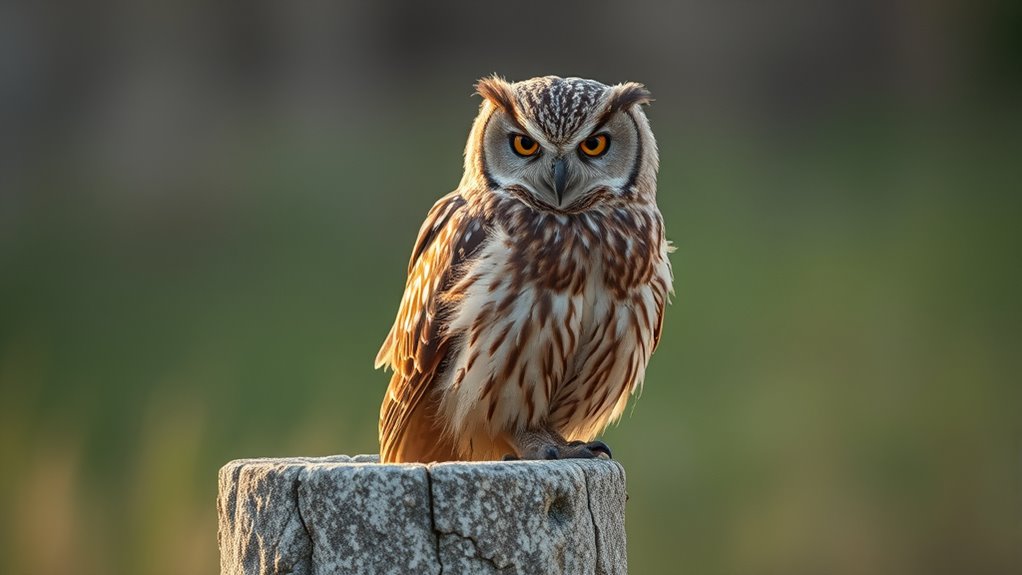You might wonder how a single bird became a symbol of wisdom. The owl’s association with Athena, the Greek goddess of wisdom, helped forge this connection. Its keen perception, vigilance, and ability to see through darkness made it a perfect emblem of insight and knowledge. This symbol has endured across cultures, representing intelligence and awareness. If you stay curious, you’ll discover more about how this remarkable creature achieved its legendary status.
Key Takeaways
- The owl is associated with Athena, goddess of wisdom, symbolizing insight, perception, and strategic thinking in ancient Greece.
- Its nocturnal nature and keen sight represent the ability to see through darkness and uncover hidden truths.
- The owl’s image was used in Greek art and mythology as a divine emblem of knowledge and vigilance.
- Over time, the owl became a universal symbol of wisdom, adopted by educational institutions and cultural representations.
- Its enduring symbolism emphasizes intelligence, awareness, and the pursuit of deeper understanding beyond surface appearances.

Have you ever wondered why Athena, the Greek goddess of wisdom, is often associated with an owl? The answer lies in the rich mythological symbolism and cultural significance that this bird holds across centuries. In ancient Greece, the owl wasn’t just a bird; it embodied traits of wisdom, vigilance, and knowledge. This connection was so strong that the owl became a visual emblem of Athena herself, representing her insight and strategic thinking. When you see depictions of Athena with an owl nearby, it’s not just decorative; it’s a deliberate symbol conveying her divine qualities. The mythological symbolism of the owl underscores its role as a creature of keen perception, able to see through darkness and concealment—traits that mirror the goddess’s ability to illuminate truth and understanding. This association has persisted through ages, shaping how people perceive wisdom and learning even today. Additionally, the owl’s reputation as a symbol of vigilance highlights its importance in alertness and awareness, qualities essential for wisdom. This connection has helped maintain the owl’s status as a universal icon of intelligence and insight.
Culturally, the owl’s significance extended beyond ancient Greece. It became a universal symbol of knowledge, often appearing in art, literature, and educational emblems. Schools and universities adopted the owl’s image to emphasize the pursuit of wisdom and enlightenment. Its nocturnal nature further reinforced this symbolism, suggesting that true wisdom often requires looking beyond the obvious and embracing the mysteries of the night. When you think about it, the owl’s ability to navigate darkness and see what’s hidden aligns perfectly with the qualities attributed to wise leaders and thinkers. This cultural significance has helped maintain the owl’s status as a universal icon of intelligence and insight.
Frequently Asked Questions
What Is the Scientific Name of Athena’S Owl?
The scientific name of Athena’s owl is *Athene noctua*, also known as the little owl. In mythological symbolism, this bird represents wisdom and knowledge in ancient Greece. As you explore this symbolism, you’ll see how the owl’s keen eyesight and silent flight embody insight and understanding. Its connection to Athena, the goddess of wisdom, highlights the importance of intelligence and perception in ancient Greek culture.
How Does Athena’S Owl Differ From Other Owls?
You notice that Athena’s owl differs from other owls through its mythological symbolism and cultural significance. Unlike typical owls, it’s often depicted with a distinctive appearance and a calm, wise demeanor. This bird symbolizes wisdom, knowledge, and protection, making it a powerful cultural icon. Its unique role in mythology elevates it beyond just a bird, embodying the values and virtues associated with Athena, the goddess of wisdom.
Are There Any Real-World Species Associated With Athena’S Owl?
You might wonder if any real-world species are linked to Athena’s owl. While no specific species is directly associated, barn owls and other owl species often symbolize wisdom and are part of bird conservation efforts. These owls inhabit diverse habitats, and protecting their environments helps preserve their populations. By supporting owl habitats, you contribute to the conservation of these wise birds and make certain they continue inspiring us with their symbolism.
How Has the Symbolism of Athena’S Owl Evolved Over Time?
You see, the symbolism of Athena’s owl has evolved through ancient symbolism and cultural interpretations. Originally, it represented wisdom, knowledge, and protection in Greek mythology. Over time, this symbolism expanded, influencing modern culture to associate the owl with intuition, mystery, and even espionage. Today, you might see it in logos or art, continuing its role as a universal symbol of insight and understanding across diverse cultures and eras.
Why Was the Owl Chosen Specifically as a Symbol of Wisdom?
You might wonder why the owl was chosen as a symbol of wisdom, especially in ancient mythology and cultural symbolism. The owl’s keen night vision and silent flight demonstrate intelligence and awareness, making it a fitting emblem. Ancient cultures linked the owl to wisdom because of its perceptive nature, and over time, it became a universal symbol representing knowledge, insight, and learning across different societies.
Conclusion
Now that you know how Athena’s owl became a symbol of wisdom, you might wonder why we still look to it today. Its watchful gaze reminds you to seek knowledge and stay alert. Isn’t it inspiring how a single bird can carry such meaning across centuries? So next time you see an owl, remember it’s more than just a bird — it’s a timeless emblem of wisdom and insight that continues to inspire us all.









